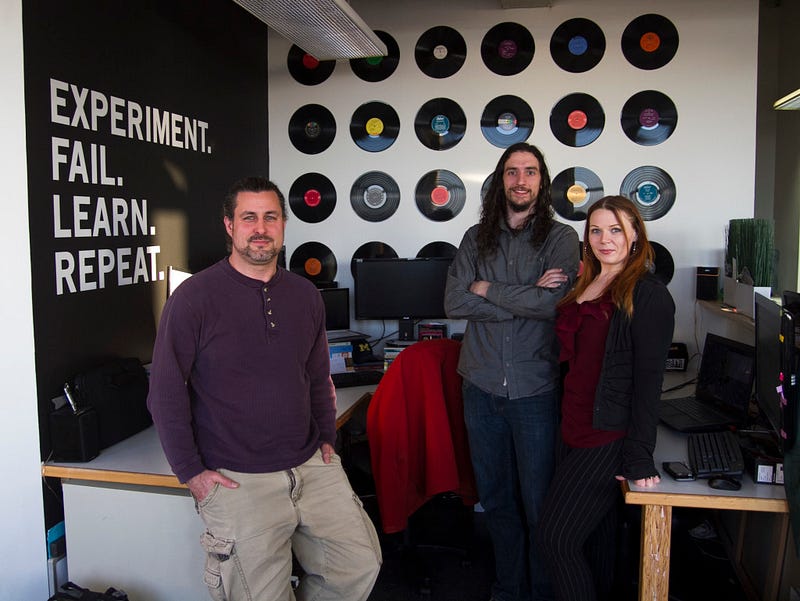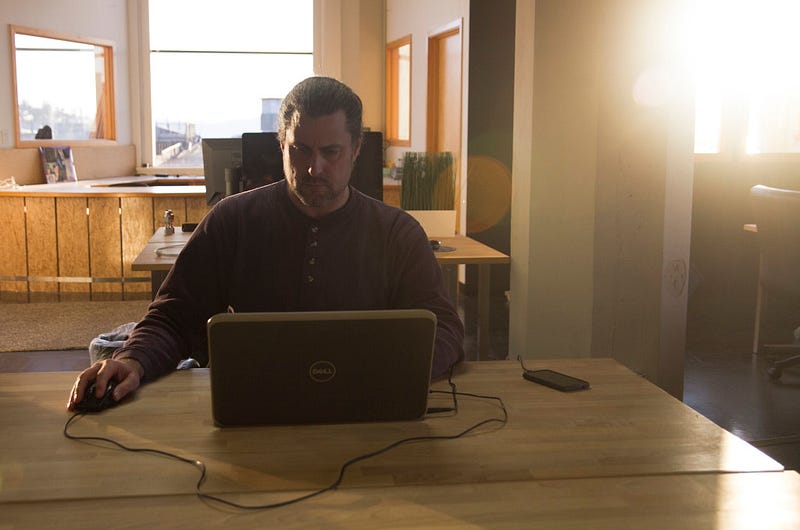Bitcoin Bankroll
Off of the internet, into your wallet
STORY BY MARINA PHILIP | PHOTOS BY NICK DANIELSON
It sounds like Monopoly money, made up by a Hackers-style computer nerd in his basement. It’s anonymous and secure, the dream for drug and arms dealers who want to take business online. But this decentralized currency is emerging as a popular alternative to modern banking among technology enthusiasts who see more potential for Bitcoin outside the web.
CoinBeyond, a Bellingham startup, hopes to make Bitcoin tangible for ordinary people. Buying with Bitcoin can be as easy as swiping a debit or credit card with CoinBeyond’s app.
The six employees of this year-old company work in a collaborative office above the Daisy Café, in a cubicle less than 7 feet on each side. Two computers and two chairs barely fit in the tiny square, but this is the creative home to a debit card reader, a card specifically for Bitcoin, and a user-friendly app. The goal is to make Bitcoin easy to accept as a retailer and easy to use as a consumer.
The idea is to make users forget they’re even using Bitcoin, says Rhys Faler, 41, co-founder and Vice President for Strategic Partnerships of CoinBeyond. It’s a practical goal, considering the complexity of this abstract, virtual currency.
Virtual Money
Bitcoin is a decentralized currency, which means no bank or government controls it. Instead of basing its value in gold or silver, like conventional currency, Bitcoin’s value is based in mathematics. Bitcoins are “mined” by individual computers, which are simultaneously processing and verifying transactions made between bitcoin users.
Bitcoins can be exchanged for United States Dollar, or USD, like any other foreign currency.

Exchanging USD for Bitcoin is not very difficult, it simply requires creating an account with a wallet service. A “wallet” is the Bitcoin equivalent of a bank account.
Some people invest money in Bitcoin hoping its value will increase in relation to USD. More often, people use Bitcoin for online payments. Because Bitcoin is decentralized and anonymous, it can be used to buy and sell illegal goods like drugs and weapons.
In 2011, the FBI shut down an online black market called Silk Road, which accepted only Bitcoin. Though Bitcoin can make illegal transactions easier, Bitcoin itself is not illegal.
A 2013 U.S. Senate hearing confirmed the legality of Bitcoin, while assessing and acknowledging the risk of increased illegal activity.
Bitcoin is gaining popularity in the legal sphere, despite its shady history. Several small businesses, like food trucks, accept Bitcoin, and major retailers, such as Microsoft, Overstock and Newegg, have more recently started accepting Bitcoin.
Everyday use
The challenge is in making Bitcoin easy for daily use by regular people and not just criminals and enthusiasts.
Faler founded CoinBeyond with two other Bitcoin enthusiasts in December 2013.
Faler, a software developer turned-business executive, says he became interested in Bitcoin in 2011, when the value of a Bitcoin jumped from $2 to about $32.
“I started mining,” he says, “basically set my computer up and it processed away. It worked for about two years. You have to have a more powerful computer to do the work as time goes on.”
After he stopped mining, he started looking for other ways to stay involved with Bitcoin, and started working on CoinBeyond to create an easy and cheap way for merchants to accept Bitcoin.
“Bitcoin works really well on the Internet,” Faler says, “But with person to person interaction, offline transactions are much more difficult to achieve. So we set out to solve that problem.”
The CoinBeyond app allows users to exchange Bitcoin like a debit or credit transaction.
A merchant can sell an item by creating a QR code using the app, which is recognized by the customer’s phone. Or the merchant can take a more traditional route and purchase a card reader, similar to the popular Square device, which reads a debit card-like Bitcoin card created by CoinBeyond.
Kellen Fox, 22, is a computer science major at Western, and has been an intern at CoinBeyond for about six months.
“We’re trying to make it similar to a credit or debit card purchase,” he says, “instead of having to have an app set up on your phone to spend your Bitcoin. It’s a little bit of a hassle.”

Swiping cards is familiar, Faler says, a distinct advantage over using QR codes.
The full package allows the merchant to accept any payment type, including debit and credit, for much cheaper than the Square app.
“Square is a very pricey option,” Faler says. “Using Square allows [merchants] to do lots of things but it also costs them a lot. With CoinBeyond, our debit and credit processing fees are cheaper and Bitcoin itself is simply cheaper, so anyone who uses Bitcoin will save the merchant fees. Because our business model is based on making money on the Bitcoin side of things, we add the debit and credit side to the merchants at a phenomenal rate, because that’s not where our primary income is coming from.”
The app can even allow the merchant to exchange the incoming Bitcoin for USD automatically, so they will hardly have to touch the Bitcoin side at all.
The start-up, just over a year old, is growing at an incredible pace. The company is in its first stages of gathering investors. Faler says they hope to collect upwards of $500,000 in investments before the end of March. In the meantime, though, they are expanding their user base of both consumers and merchants.
The goal is to make a mini ecosystem of Bitcoin use, Faler says, by working with merchants, consumers and by collaborating with other Bitcoin startups. Recently, CoinBeyond has developed a partnership with Bitwage, a California startup, which allows employers to pay their employees with both Bitcoin and USD.
“We’re really excited to come up with a solution to bring Bitcoin into more mainstream adoption,” Faler says.
Why Bitcoin?
There are many reasons why people should use Bitcoin, Faler says. International travel, for instance, is much cheaper without international exchange and transaction fees.
The team of cofounders recognized Bitcoin as a potential solution to some of the problems with modern banking.
The prevailing currency system of bank transactions is outdated and flawed, Faler says.
“It’s full of holes,” he says. “Security for it is terrible.”
Instead of having one giant server that processes all transaction fees through a bank system, the computing power is distributed among millions of individual computers belonging to normal people, Faler says.
“When you swipe your VISA card, information gets sent to their servers, processed and sent back,” Faler says. “It’s a very energy intensive process, that’s why you get high transaction fees.”
It takes about 45 days to process a transaction through a service like VISA, he says. Even though the transaction is shown on your account, the currency isn’t truly transferred between accounts until more than a month later.
A Bitcoin transaction, on the other hand, takes only ten minutes because the power required is distributed over hundreds of different computers. During that ten minutes the Bitcoin will be processed four or five times. Eventually every mining computer will verify the transaction.
Having multiple computers verify the transaction makes the exchange more secure as well, Faler says.
“With VISA, let’s say you hack into their computer system, you can say give me a million dollars, and maybe take it away from someone else,” he says, “With Bitcoin that’s not possible, because you have all the records of every transaction that ever occurred. You’d have to hack all those computers at the same time, which is impossible. It’s much more secure.”
Bitcoin may be the solution to many flaws in modern banking, Faler says, but even if Bitcoin doesn’t become the next universal currency, it could forge a path for another currency system that is even better.
“Is it the perfect answer for every single financial thing? No,” Faler says. “Will it replace the USD? I don’t believe so. Within our nation [U.S. currency] works fine but for international purposes it is an easy answer. Why would you not use Bitcoin?”